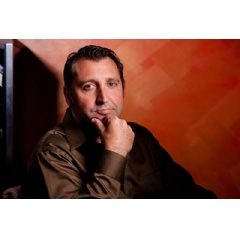New book explores inflationary media’s role in the Trump phenomenon
Authors say democracy is unsustainable without “reality literacy”
As the transition of power begins in Washington and the nation continues a collective discussion on the outcome of the presidential election, a new book is adding valuable insight to the dialogue through its exploration of the media conditions that allowed for the Donald Trump phenomenon to take place.
“We started writing this book three years ago,” says David Castillo, University at Buffalo professor of Romance languages and literatures and director of the university’s Humanities Institute. “You could now in hindsight think of this book as a prediction, not necessarily of Trump himself, but the Trump phenomenon.”
“Medialogies: Reading Reality in the Age of Inflationary Media,” co-authored with Johns Hopkins professor William Egginton, is already being praised. The esteemed European philosopher Santiago Zabala says, “Every epoch demands, expresses and is determined by a book. Most of the time these texts are noticed years after the fact.… But ‘Medialogies’ will have an immediate impact.”
Medialogies is ultimately a book about reality literacy and its authors stress the need to invest in a renewed understanding of how news is constructed and presented. Failing to move toward a more enlightened approach is to remain trapped in the framed reality of media silos, they say.
“The most dangerous promise of the market society today is the claim that we have a right to our own reality,” says Castillo. “Yet this is precisely what the 24-hour media cycle has produced and reality is actually being lost in the rising prominence of this new media culture.”
The result is what the authors call a “crisis of reality” brought on by inflationary media.
Castillo says the media is inflationary not because of a single message, but because its cumulative effect alters world views. Democracy is unsustainable in an environment where basic facts are ignored and people listen only to those opinions that agree with their own.
“President Obama alluded to this in his final State of the Union Address when he mentioned how the Soviets beat the U.S. into space At the time, no one denied Sputnik or the science responsible for it,” says Castillo. “But today polls show that most Americans deny climate change even though the scientific community is in near consensus about its threat.
“If we’re going to have a conversation about climate change or other serious issues we have to realign the border between the visible and the invisible.”
We’ve done it before.
Four hundred years ago, different media brought a similar crisis, according to Castillo.
“This is the very focus of the entire culture of the early modern period, particularly in Spain,” says Castillo. “It’s a reflection on the border between appearance and reality and differing ways in which mainstream culture and contesting versions of that culture imagine what’s visible and invisible.”
The authors see Miguel de Cervantes as a model for critical humanist thought because of his perspective on the media of the first inflationary age.
“When mass media first created a crisis in the concept of reality through the emergence of mass theater, the printing press and new perspectives in painting, Cervantes developed special insight into how the media framed not only what we see, but what we want to see,” says Castillo. “His response was not to deny reality but to show how the world can present different versions of reality and how to develop the power to attune minds to actively read reality as opposed to passively receiving it.”
Today we see a possible parallel in comedians like Stephen Colbert, who coined the term “truthiness,” to refer to the phenomenon where reality is ignored in favor of individual truths.
Even Silicon Valley is trying to edit reality as it works on developing technologies like “smart glasses” or “smart contact lenses” that remove “disturbing sites” from our vision, “like homeless people,” according to the futurist Ayesha Khanna.
“When did you last hear about land devastation in Africa? Or garbage being dumped in the oceans? These are among the truths already outside our frame of reality,” says Castillo.
“We’re already wearing those glasses,” he says.
Castillo says the choice to remain in these media silos, protected and ignorant to what might challenge our world view, makes people complicit in their own blindness.
“As hard as it may be to engage in reality literacy, we can’t afford not to,” says Castillo.
( Press Release Image: https://photos.webwire.com/prmedia/2/206325/206325-1.jpg )
WebWireID206325
This news content was configured by WebWire editorial staff. Linking is permitted.
News Release Distribution and Press Release Distribution Services Provided by WebWire.
